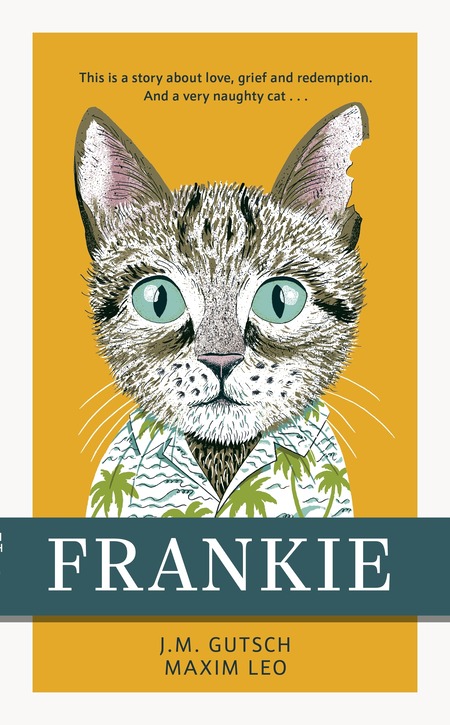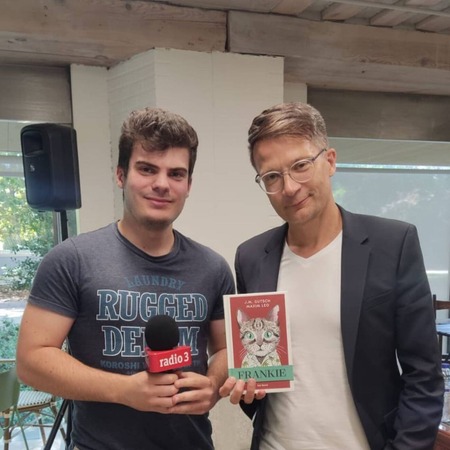(courtesy Penguin Books Australia)
If you have ever travelled through the valley of the shadow of death of grief – and yes, that is some prime-grade Psalms-level language there but being plunged into grief often feels quite Biblical – you will know that it feels like it is sucking all the air from the room, all the vivacity from life and all the hope from your expectations of how things will play out.
It’s a vile and savage beast that cares not for facts on the ground and which defies any and all ability much of the time to be reasoned with or though through; it’s primal emotional animal and all you can do is try to hang on and hope it doesn’t do you too much as you journey through its wild and unpredictable lands.
Frankie by J. M Gutsch and Maxim Leo (translated from the German by Sharon Howe) captures how dark and distressing the quiet tumult of grief can be and in a way that may surprise you and which will, trust us, despite the subject matter, frequently delight you.
The delight chiefly comes from the eponymous protagonist, a talking cat, and yes, it’s all very Dr Doolittle in some ways but in this reality anyone who wants to can converse with their feline friends, and while that might sound ridiculously fanciful and not the usual way to tackle such a weighty issue as grief, it absolutely works in ways that have you laughing, quietly and wanting to wrap your arms around Frankie the Cat and Richard, the man be befriends, initially out of pure self interest.
I [Frankie] point to my belly and my mouth.
Reassuring me, he replies, ‘MUNCHY-MUNCHY? YOU? I FETCH FOOD!’
And if you ask me, those were the first sensible words the man named Richard Gold had spoken.
Frankie is a stray whose previous owner died suddenly, leaving him to fend for himself on the town’s rubbish heap, where he lives in a bathtub and is friends with a dog and a squirrel.
It’s a hardscrabble existence that ends when Frankie essentially adopts Richard whom he notices playing with string – as a cat he doesn’t understand the concept of suicide and think Richard simply likes using string to while away, which does make sense to a cat – and who is none too pleased to have a stray kitty interrupt his plans to end it all.
The genius and heartfelt wonder of Frankie is that this meeting doesn’t automatically make everything better.
It might have been highly tempting for the two authors to make this a jolly story about one man meeting a pushy, rude and gleefully insistent cat – trust me, you will love him; he has a good heart but as with all cats, and I love them, is out for himself in the main … until he’s not – and having his life happily and perfectly transformed.
If left in the hands of Hollywood, that’s likely what would have happened.
But in the hands of Gutsch and Leo, Frankie tells a far more nuanced, affecting story, one that embraces hope but with a sage and incisive eye fixed on the fact that while life can get better, even in the depths of grief, it cannot and does not heal itself overnight.
(courtesy iVoox)
What leavens Frankie without once robbing of an intense and lingering emotional impact is how delightfully clueless our protagonist is about humans.
Sure he can speak humanish and a good many animal languages beside, but he’s also only ever had fleeting contact with people, and while he knows words, he doesn’t understand many of the concepts behind them.
Suicide is just one of the many ideas that Frankie grapples with on his journey from clueless stray cat with a sharp mind, a good heart and a very feline need to be fed on time and let out to wee etc when needed, to a cat who genuinely cares about his new owner (of course he’s a cat so he doesn’t see “Gold”, as he calls him, in those terms) and who goes to great lengths to save him from repeated attempts to end his life.
The amazing part about this pocket-sized novel with the emotionally epic story is that Gutsch and Leo beautifully balance the whimsical notion of a talking cat who dreams of stardom and a good home and a man caught in the terrifying afterwash of losing his wife to a random accident.
Neither cannibalises the other and Frankie manages to be both penetratingly intense in its portrayal of grief and the mental health issues that often following during and in its wake, and quirkily funny about a cat whose ignorance of humanity does a wonderful job of shining a welcome light on our quirks and foibles.
We drive back through the big wide world again. Along an endless road, past fields and meadows and woods. I creep on to Gold’s lap and he strokes my head while the car roars and shakes like mad. But it doesn’t scare me any more. And as we’re driving along together like that, Gold and me, I feel really happy. I don’t think I’ve ever felt so happy in my life. I want that moment to last for ever.
Frankie is the ultimate outsider, not even from the same species as the man who he helps every bit as the man helps him, and it’s his perspective that casts so much light on Richard’s plight as a man unable to recover from the loss of his beloved wife.
Because grief and loss, and even the idea of wanting to kill yourself are all new to Frankie, we get a far greater appreciation for what Richard is going through because Franke asks so many questions that many people would think to ask, and even if they did, wouldn’t dare utter.
But Frankie doesn’t understand societal norms and so he asks the sort of questions many of us wouldn’t, free from societal norms that say such questions are far too intrusive.
His queries may seem brusque and insensitive but he is genuinely curious, and shocked by how Frankie just comes out and asks things, Richard begins to open up and consider his position in ways he might not otherwise have done.
Frankie however is no easy tale of grief excised by an unconventional approach and while the book ends with progress towards healing and a new life genuinely being made, the story isn’t over by that point although it is heading in the right direction and while we are left with hope but not absolute certainty, we are assured that there is a way out of grief, even if it isn’t easy, and it may, to everyone’s surprise, involve a cat who asks the questions that need to be asked and who is there for someone, as much as they are there for him, when it matters the most.

